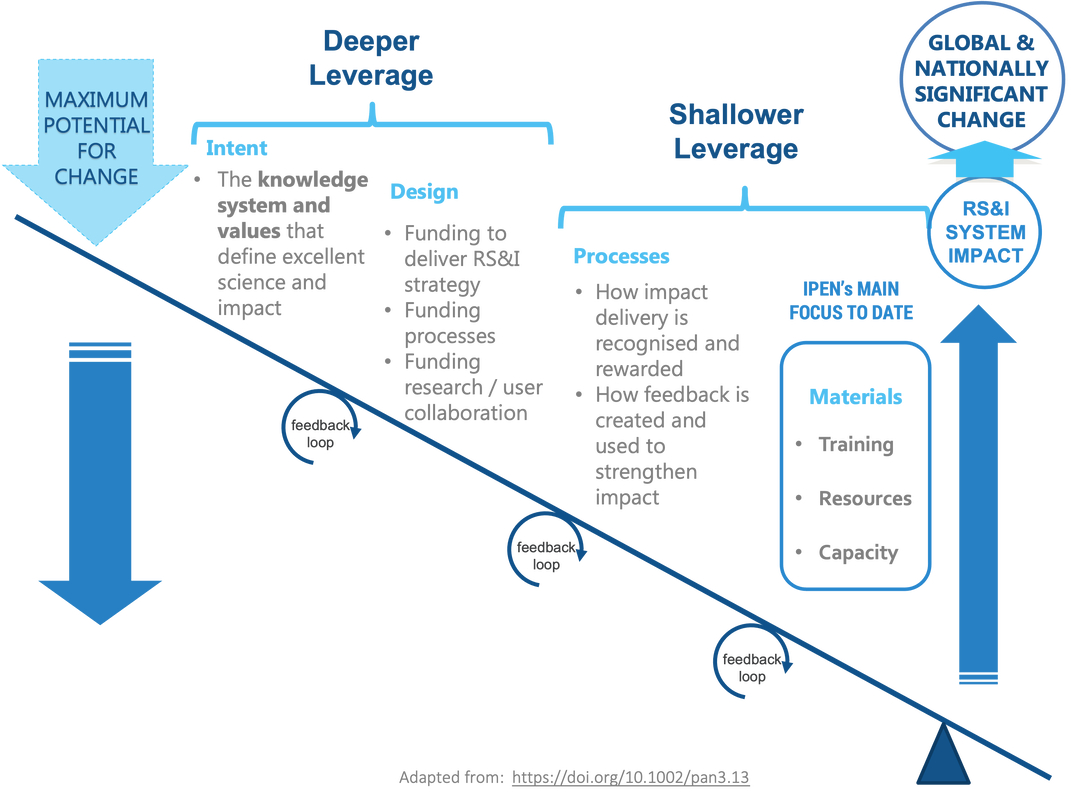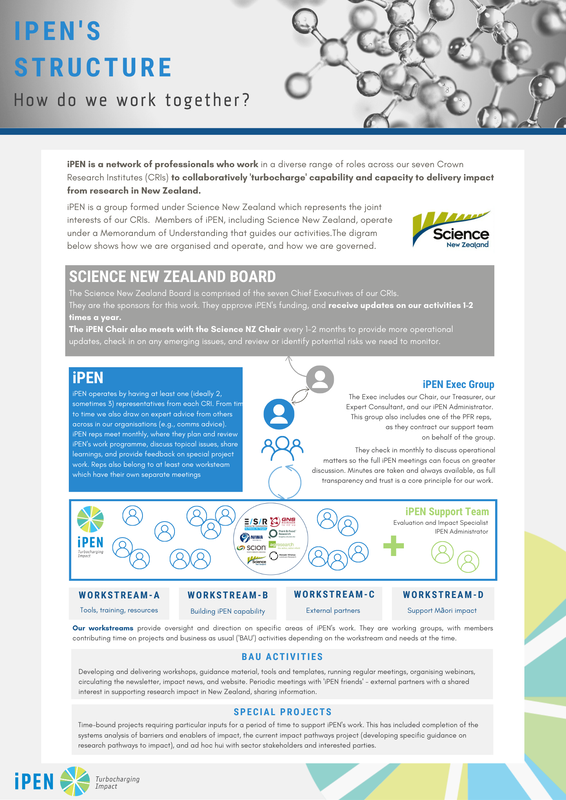As part of our work iPEN shares a range of tools and templates that you and your team can use to support impact delivery. IPEN has also developed a range of other reports and guidance material which you can find here too.
|
iPEN's organisational toolkit
Systematically building capability in organisations requires a clear framework. Here is the framework we developed and are using to guide our efforts in our respective organisations and others in the RSI system. In this short document you'll find a brief overview to our approach, a clear framework (rubric) that helps us track progress (including a summary of our 'baseline' in 2019), and a 'blueprint' for building impact and evaluation capacity into organisational roles and structures. Click here to view and download. |
|
|
iPEN's training modules and training pathway
We've developed a linked set of training 'modules' to systematically build people's capability in research impact. This interlinked modules follow a bit of a pathway, so we have developed a brief explanation of what each module covers and a suggested order to follow. Click here to view the pathway. Don't forget to look at the resources and information we've developed for each of these modules under the TRAINING Menu at the top of this page. |
|
|
Systemic barriers and enablers of research impact
In 2022 the iPEN team completed an analysis of the systemic barriers and enablers to research impact. We did this so we could see if there were additional 'interventions' we could do, or support others with. To read our findings click here. The 'so what now' (opportunities for action) can be found below. To read more about this work click here to read the new item we posted about it. |
|
Opportunities for systemic action to support greater research impact
We applied the concept of 'leverage points' from the systems literature to identify opportunities for action within the New Zealand Research Science and Innovation system if we want to 'turbocharge' impact. Click here to read about our ideas. We also discussed these at a hui we organised with a wide range of others in the RSI system. You can find the write up of this hui below. |
|
Sharing and learning with the wider sector - how could we collaborate to support research impact?
We organised a hui in February 2023 with others working in the New Zealand Research Science and Innovation sector who have an interest in supporting and increasing research impact. We shared and discussed the findings from our systems analysis with them, talked about what they were seeing (and how similar or different that is to our experience) and talked about how we might collaborate (and on what) in future. Click here to read the summary of this session, or here to read our new item on this event. Then in November 2023 we co-hosted a follow-up hui. Part of the motivation for this follow-up day was to test the appetite for an informal Aotearoa Research Impact Community of Practice. Click here to read the write up to read the write up of this follow-up hui. |
iPEN webinars and newsletter
iPEN runs a regular series of webinars to show diverse examples of how impact has been achieved. The presenters and topics are diverse, ranging from researchers reflecting on their use of specific tools (such as programme logics), to funders and other experts sharing their insights on how we can collectively support research impact in New Zealand. You can view all our webinars on our Vimeo page.
iPEN also shares a (nearly) monthly newsletter . We won't crowd your inbox in those months everyone is busy (like the EFY), and keep it short and sweet. To view our archive or to subscribe click here. We usually cross reference to our 'Impact News' page, so take a look over there too.
iPEN runs a regular series of webinars to show diverse examples of how impact has been achieved. The presenters and topics are diverse, ranging from researchers reflecting on their use of specific tools (such as programme logics), to funders and other experts sharing their insights on how we can collectively support research impact in New Zealand. You can view all our webinars on our Vimeo page.
iPEN also shares a (nearly) monthly newsletter . We won't crowd your inbox in those months everyone is busy (like the EFY), and keep it short and sweet. To view our archive or to subscribe click here. We usually cross reference to our 'Impact News' page, so take a look over there too.
iPEN Training tools and templates
Here is the full set of tools and templates we share with our participants:
Programme Logics
We use the Beyond Results programme logic template given it's already got a history of use in CRI projects. You can access either a pdf, word, or powerpoint versions by clicking on the file type you prefer. We tend to find the powerpoint template the most flexible but it is a matter of personal preference. If you're in the early stages of developing your ideas, you might like to consider using a tool like Miro or Mural which gives you even greater flexibility to brainstorm your ideas .
Impact Planning Tools
We use the Beyond Results Impact Planning Tool in our workshops to help participants systematically think about what stakeholders might be interested in their project, why, and when. You can access a word version of this tool.
We also developed an adapted version of this tool to support you thinking about how to engage and communicate with your various stakeholders, which we use in Module 8 - Communicating Your Impact. This can be found here.
Monitoring and Evaluation
We have developed a couple of tools we share with participants to support them think about what data they might need to collect to track their progress towards impact. View this M&E Framework resource as an excel file here.
And don't forget to keep a copy of the reflective questions you should be asking as you plan and progress your project, along with your programme logic.
Because developing a full 'M&E' framework and plan can't always be resourced, we've also developed an alternative reflective practice guide. This is a more adaptable but still fit-for-purpose way you can critically 'check in' on progress (ideally with your team).
NOTE - we are in the process of updating this particular tool as we prepare to launch our Reflective Practice workshop (module 7 - Extending your Impact Toolkit).
Don't forget there are many more tools you can explore and use as you work 'around' the cycle. Click on the TRAINING menu for more ideas or if you've already attended one of our workshops, review the slides you received for lots more suggestions and links.
Here is the full set of tools and templates we share with our participants:
Programme Logics
We use the Beyond Results programme logic template given it's already got a history of use in CRI projects. You can access either a pdf, word, or powerpoint versions by clicking on the file type you prefer. We tend to find the powerpoint template the most flexible but it is a matter of personal preference. If you're in the early stages of developing your ideas, you might like to consider using a tool like Miro or Mural which gives you even greater flexibility to brainstorm your ideas .
Impact Planning Tools
We use the Beyond Results Impact Planning Tool in our workshops to help participants systematically think about what stakeholders might be interested in their project, why, and when. You can access a word version of this tool.
We also developed an adapted version of this tool to support you thinking about how to engage and communicate with your various stakeholders, which we use in Module 8 - Communicating Your Impact. This can be found here.
Monitoring and Evaluation
We have developed a couple of tools we share with participants to support them think about what data they might need to collect to track their progress towards impact. View this M&E Framework resource as an excel file here.
And don't forget to keep a copy of the reflective questions you should be asking as you plan and progress your project, along with your programme logic.
Because developing a full 'M&E' framework and plan can't always be resourced, we've also developed an alternative reflective practice guide. This is a more adaptable but still fit-for-purpose way you can critically 'check in' on progress (ideally with your team).
NOTE - we are in the process of updating this particular tool as we prepare to launch our Reflective Practice workshop (module 7 - Extending your Impact Toolkit).
Don't forget there are many more tools you can explore and use as you work 'around' the cycle. Click on the TRAINING menu for more ideas or if you've already attended one of our workshops, review the slides you received for lots more suggestions and links.
|
iPEN Structure
Interested in how iPEN has organised itself and stays accountable to our respective organisations? Click here to read a little more. Don't forget you're welcome to get in touch if you'd like to know more. Just complete this contact form or click on the Contact Us button at the bottom of this page. |
iPEN's Submission to Te Ara Paerangi
Like many other organisations, iPEN made a submission to the Te Ara Paerangi Green Paper in March 2022.
Click here to read and what we said and here to access the appendix we included. Our submission makes particular reference to the work we were doing to better understand the barriers and enablers of research impact. The full write up of this work can be found above.
Like many other organisations, iPEN made a submission to the Te Ara Paerangi Green Paper in March 2022.
Click here to read and what we said and here to access the appendix we included. Our submission makes particular reference to the work we were doing to better understand the barriers and enablers of research impact. The full write up of this work can be found above.





